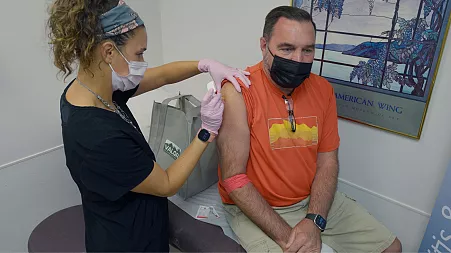Five people in New Hampshire have contracted a potentially fatal bacterial infection called Legionnaires' disease after being exposed to water droplets from a contaminated cooling tower, the New Hampshire Department of Health and Human Services reports.
Health officials have warned the elderly and those with compromised immune systems to "assess their health risk" before entering within a half mile radius of the cooling tower, behind the RiverWalk Resort, and those who live in the area should closely monitor their symptoms.
"Anybody who has visited the area near the contaminated cooling tower should monitor themselves for symptoms," Benjamin Chan, New Hampshire state epidemiologist, said in a statement.
"People who develop fever or other symptoms of pneumonia within 14 days after spending time in this area should talk to their healthcare provider about testing for Legionella infection."
Legionella are bacteria that can be spread through water systems like cooling towers and fountains, as well as domestic fixtures like showerheads, sink faucets, hot tubs and hot water tanks.
Because these bacteria occur naturally in freshwater environments, small amounts of them don't tend to cause problems. However, if this water is warm, stagnant or contained in a vessel with slimy surfaces for bacteria to grow, then it can multiply and start to cause problems.
Once the bacteria grows within these water systems, the most common way for it to spread is through tiny water droplets in mist, which are small enough to be inhaled.
The majority of healthy people exposed to Legionella don't get sick. For those who do show symptoms, the bacteria can cause one of two forms of lung disease:
- Pontiac fever—a mild, respiratory infection that sets in after a few hours of days of exposure and goes away by itself.
- Legionnaires' disease—a severe, potentially fatal form of pneumonia that can lead to lung failure
"The bacteria can cause a more serious pneumonia called Legionnaires' disease, which can be fatal if left untreated," the New Hampshire Department of Health and Human Services (HHS) said in a statement.
The Centers for Disease Control estimates that roughly one in 10 who get sick with Legionnaires' disease die due to complications from the illness.
Symptoms of Legionnaires' disease don't set in right away, and usually take two to 14 days to develop following Legionella exposure. Symptoms include cough, fever, headaches, muscles aches, shortness of breath, and, in some cases, nausea and diarrhea.
People over 50 and current or former smokers are at an increased risk of these severe symptoms, as are those with cancer, chronic lung disease, diabetes, kidney failure, liver failure or a weakened immune system.
The New Hampshire Department of Health and Human Services have said that the RiverWalk Resort has partnered with the HHD to address the contamination.
Is there a health problem that's worrying you? Let us know via health@newsweek.com. We can ask experts for advice, and your story could be featured in Newsweek.
Update 8/13/2024, 9:55 a.m. ET: This article has been updated to specify the nature of the disease.
Disclaimer: The copyright of this article belongs to the original author. Reposting this article is solely for the purpose of information dissemination and does not constitute any investment advice. If there is any infringement, please contact us immediately. We will make corrections or deletions as necessary. Thank you.




